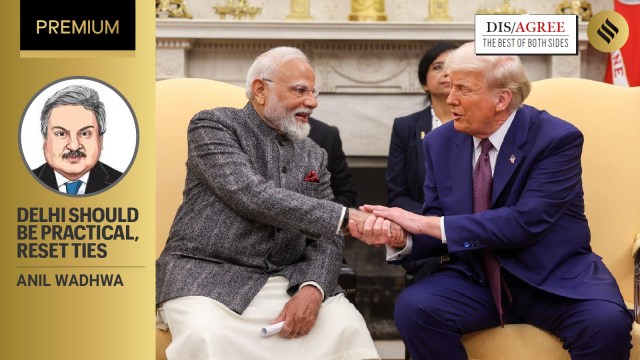
The transatlantic alliance has been knocked off its axis. The pronouncements by US Vice President J D Vance at the AI Summit in Paris and the Munich Security Conference, and the “stark strategic realities” outlined by US Secretary of Defence Peter Hegseth at the NATO headquarters — that the US “will prioritise empowering Europe to own responsibility for its own security” — have left no doubt that the alliance is considerably weakened. At the Riyadh meeting, US and Russian high-level officials, in the absence of Europe and Ukraine, have agreed that Ukraine cannot be a part of NATO, even while leaving open “negotiations” to Russia and Ukraine under Washington’s watch, conceding that it would be unrealistic for Russia to return to the status quo with respect to territory, and that sanctions on Russia will need to end following a peace deal.
At an urgent meeting of European leaders called by French President Emmanuel Macron in Paris, there was a sobering realisation that Europe needs to build its own defence industrial capabilities to uphold its sovereignty. The US-Russia negotiations over Ukraine present them with the challenge of containing Russia in Eastern Europe to prevent what they fear could be a future attack on them, while fortifying their own borders in case Ukraine caves to Washington and Moscow’s combined pressure and the public opinion of the Ukrainian people – a likely possibility that would stretch Europe’s resources much more and divide it even further.
Although NATO chief Mark Rutte has said Europe is ready to step up and spend more on defence, there is a scenario in which the US could trade its presence on NATO’s eastern flank, not involve the Europeans in negotiations on Ukraine, and oppose the deployment of European troops in Ukraine to guarantee peace. British Prime Minister Keir Starmer has said that the US must backstop any European security guarantees but Trump has not been forthcoming.
The Palestinian cause suddenly seems hopeless. In the face of a plan agreed upon between US President Donald Trump and Israeli Prime Minister Benjamin Netanyahu to build a “riviera” in Gaza after permanently displacing the Palestinian people, the Gulf Cooperation Council states and the Arab neighbours have been left scrambling. Under pressure from Trump, they are trying to put together an alternative roadmap that will prevent the planned expulsion of Palestinians but will put the burden on them to fund Gaza’s reconstruction.
Even as China remains a fierce rival in technology and trade and a geopolitical rival, Trump seems ready to cut a deal with President Xi Jinping on the trade front. US officials have cast the outreach to Moscow as a bold effort to draw Russia away from China, mend ties with a nuclear adversary and halt a war that has already led to hundreds of thousands of casualties. There are fears that this could put the Chinese fox in the henhouse with the European goose and its golden eggs, and leave Taiwan to its own fate. This is a world of the strong. It is transactional and there are no friends or enemies.
Going forward, therefore, it is imperative for India to reset its diplomatic sights and anticipate the imponderables. A few trends are clear. Europe will likely turn more inward, and it will reciprocate on US tariffs. New avenues could open up for countries like China, India, Vietnam and other labour-intensive manufacturing countries. Once peace returns, Ukrainian sunflower oil, fertiliser, wheat and natural commodities will be available in the market again, bringing down prices for countries of the global South. Ukraine and Gaza will throw up opportunities for reconstruction. Europe will press ahead with its CBAM (Carbon Border Adjustment Mechanism) tax which will mean Indian steel, cement and other products on which CBAM will be imposed in the initial years before the list is expanded, will face higher duties. Yet, this will be a level playing field. Indian industry will be able to adopt greener ways of manufacturing, which will be beneficial in the long run.
India also has a real chance to forge ahead with digital partnerships with Europe and the US and find common ground on AI regulation, e-commerce and data storage norms with Europe, since both favour a middle path. India will have more choices in joint manufacturing and technology transfer in its defence imports. Delhi also needs to redouble its efforts at forging FTAs with the United Kingdom, the European Union, the GCC and Africa as well as Latin America and a full CECA (Comprehensive Economic Cooperation Agreement) with Australia to liberalise trade, open up new avenues for boosting exports, and create better conditions for itself by becoming part of valued and reliable supply chains.
The writer is a former secretary, Ministry of External Affairs and has served as the Indian ambassador to Italy, Thailand, Oman and Poland. Currently, he is a distinguished fellow at the New Delhi-based Vivekananda International Foundation